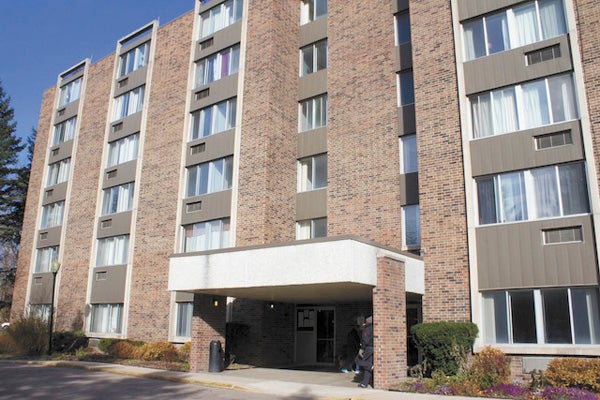Owners struggle to fill vacancy in rental homes
Published 7:50 am Thursday, November 14, 2013

Chestnut Towers, located at 100 Chestnut Street. The apartment complex is one of two public housing facilities operated by the Dowagiac Housing Commission. Leader Photo/TED YOAKUM
The Dowagiac Housing Commission is currently facing a common issue impacting other apartment and housing complexes in recent years: a decline in tenants.
Amidst budget cuts from the federal government over the past three years that have reduced their overall operating funds, as well a job market that is still in a sluggish state of recovery, the commission, which provides housing and assistance for lower-income individuals and families, is struggling to fill vacancies in its two subsidized housing locations. Both the Chestnut Towers and the Parkside housing facilities have 10 unfilled apartments between them, the highest since current director Sandra Freeman took over the position seven years ago.
In the past, a decline in rent from tenants wouldn’t have such a severe impact on the commission and the people using its housing units. However, when combined with the decrease in federal funding, this has created a potent one-two punch that has complicated the organization’s operations.
“We used to be funded at 100 percent of what we needed,” Freeman said. “This year we’re only getting around 82 percent.”
Since federal funds can no longer completely cover operating expenses, Freeman has been forced to reduce her and her four person staff’s hours, bringing them down to four working days per week. In addition, the commission may have to delay some maintenance work to its apartments, Freeman said.
However, the commission has a plan to help combat the decay, starting with overcoming some negative perceptions that Freeman said many in the public have surrounding subsidized housing.
“I’ve heard it throughout my entire career that federal housing is more or the less the projects,” Freeman said. “That’s a just perception that people have.”
However, the housing units the commission is responsible for largely lacks the kinds of issues with crime and drug use that many associate with such facilities, Freeman said, and has a large variety of tenants ranging from retired veterans to families with multiple children.
“[Chestnut Towers] has the cheapest rent in town, if you ask me,” said George Wade, who has lived in the apartments for more than years. “The Hardings is right across the road, so it’s easy to get groceries when you need to, especially in the summer.”
Another misconception that many have is that their annual income is too high to qualify for subsidized housing, Freeman said. In actuality, Freeman said the number of eligible Cass County households is much higher than most expect. Individuals making as much as $32,000 a year could potentially qualify for an apartment, according to county mandates.
As a result, some lower-income individuals are struggling with housing payments that exceed 30 percent of their annual income, the amount that federally subsidized housing units charged its tenants, Freeman said.
“When we see people with very limited income, and they feel there’s no hope to have anywhere else to go, and we’re sitting right here with a product that can help them, it becomes a little frustrating,” Freeman said. “Some people try make a decision between medicine or food, trying to decide what’s more important, when they’re paying rent that costs more than 30 percent of their income. They could come here and pay for it all.”
In addition to housing options, the commission also provides Section 8 vouchers to residents, who can use them to pay for a residence outside of the public housing complexes at a reduced cost. The commission is currently servicing these vouchers to more than 114 families in the region, Freeman said.
At the end of the day, Freeman views both the vouchers and the two housing complexes as a means to help lower-income households survive the waters of a still-often turbulent economy, and even as a means to help some families gain control of their futures, she said.
“One our tenants was recently selected to move into the new Indian house, which was pretty exciting,” Freeman said. “Really that’s what subsidized housing is for, it’s like a stepping stone. You don’t need to stay there forever, you can use it on the path towards home ownership.”






